Serving 965 students in grades Prekindergarten-5, Barfield Elementary School ranks in the top 20% of all schools in Tennessee for overall test scores (math proficiency is top 20%, and reading proficiency is top 20%).
The percentage of students achieving proficiency in math is 49% (which is higher than the Tennessee state average of 31%). The percentage of students achieving proficiency in reading/language arts is 45% (which is higher than the Tennessee state average of 37%).
The student:teacher ratio of 16:1 is higher than the Tennessee state level of 15:1.
Minority enrollment is 47% of the student body (majority Black and Hispanic), which is higher than the Tennessee state average of 43% (majority Black).
Quick Stats (2025)
- Grades: Prekindergarten-5
- Enrollment: 965 students
- Student:Teacher Ratio: 16:1
- Minority Enrollment: 47%
- Overall Testing Rank: Top 20% in TN
- Math Proficiency: 49% (Top 20%)
- Reading Proficiency: 45% (Top 30%)
- Science Proficiency: 51% (Top 30%)
- Source: National Center for Education Statistics (NCES), TN Dept. of Education
Top Rankings
Barfield Elementary School ranks among the top 20% of public schools in Tennessee for:
Category
Attribute
Overall Rank
Math Proficiency
Diversity
School Overview
Barfield Elementary School's student population of 965 students has stayed relatively flat over five school years.
The teacher population of 61 teachers has grown by 5% over five school years.
Grades Offered
Grades Prekindergarten-5
Total Students
965 students
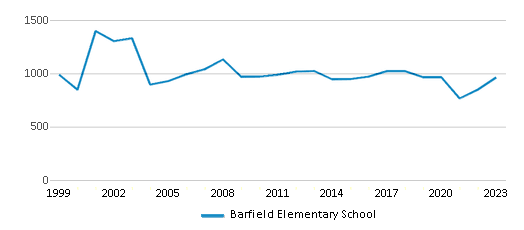
Gender %
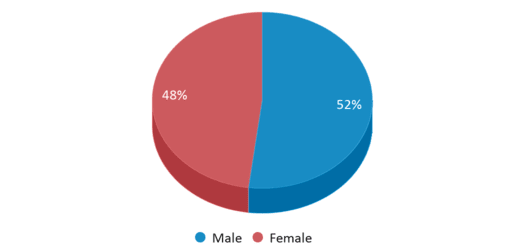
Total Classroom Teachers
61 teachers
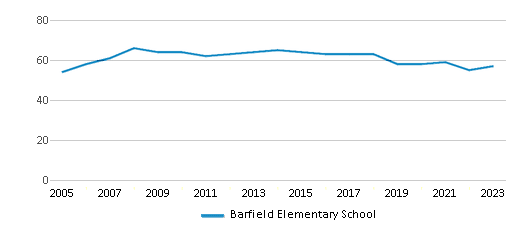
Students by Grade
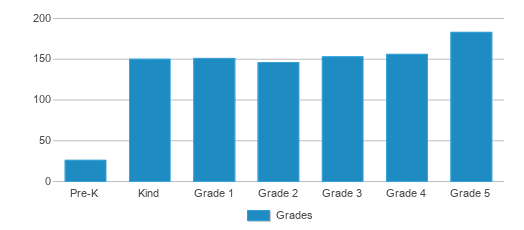
School Rankings
Barfield Elementary School ranks within the top 20% of all 1,761 schools in Tennessee (based off of combined math and reading proficiency testing data).
The diversity score of Barfield Elementary School is 0.66, which is more than the diversity score at state average of 0.61. The school's diversity has stayed relatively flat over five school years.
Overall Testing Rank
#296 out of 1761 schools
(Top 20%)
(Top 20%)
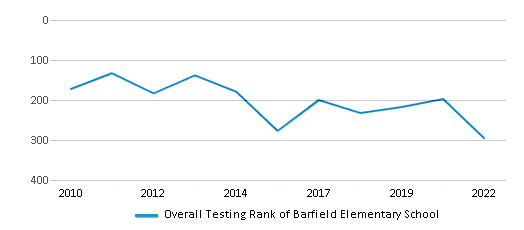
Math Test Scores (% Proficient)
49%
31%
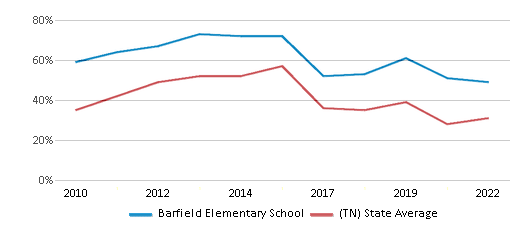
Reading/Language Arts Test Scores (% Proficient)
45%
37%
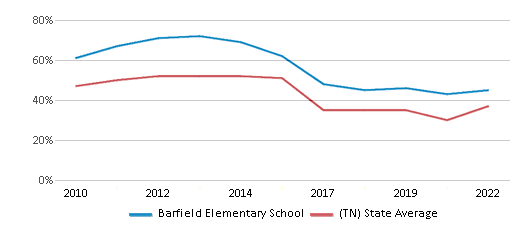
Science Test Scores (% Proficient)
51%
40%
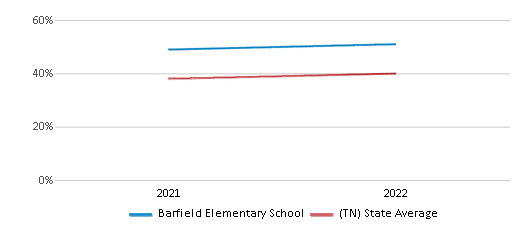
Student : Teacher Ratio
16:1
15:1
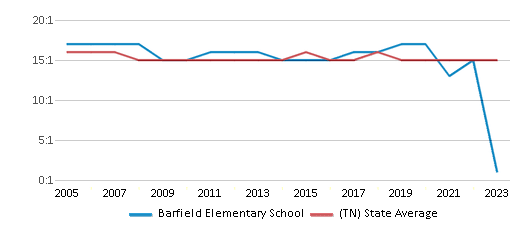
American Indian
n/a
n/a
Asian
4%
2%
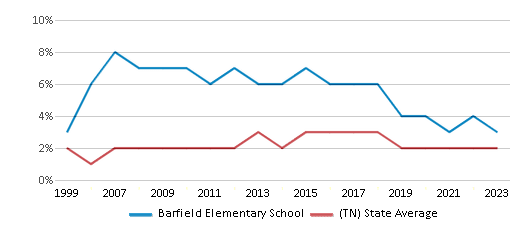
Hispanic
15%
15%
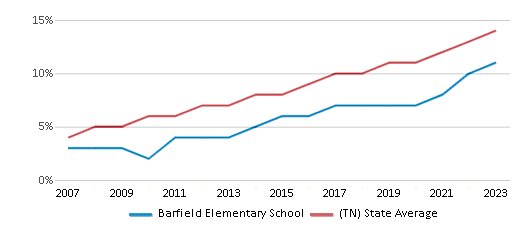
Black
19%
21%
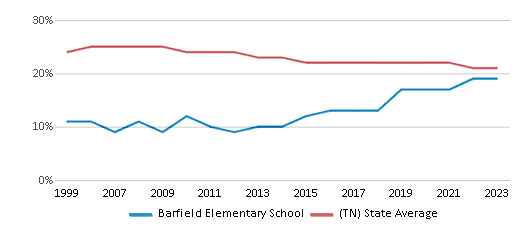
White
53%
57%
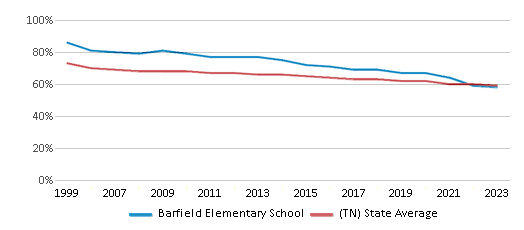
Hawaiian
n/a
n/a
Two or more races
9%
5%
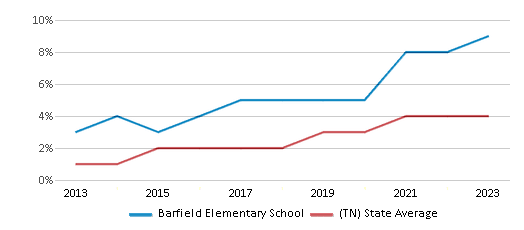
All Ethnic Groups
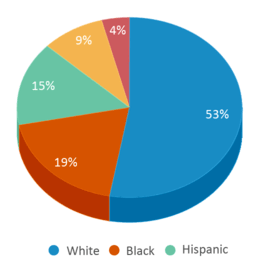
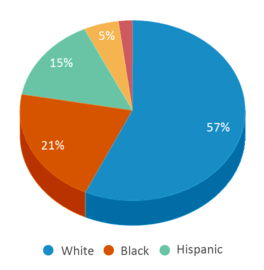
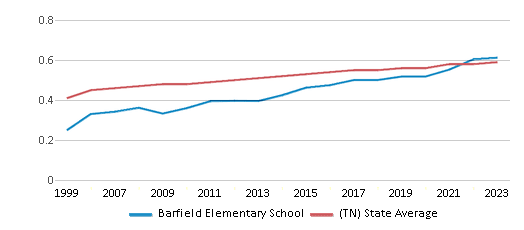
Participates in the National School Lunch Program (NSLP)
Yes
Eligible for Free Lunch
22%
45%
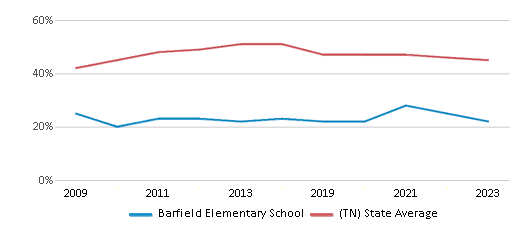
Eligible for Reduced Lunch
5%
6%
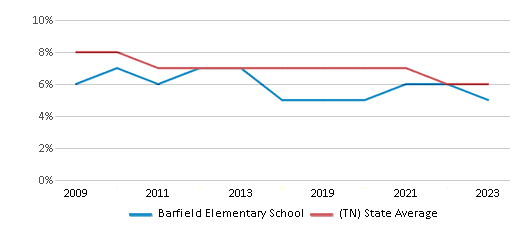
School Statewide Testing
School District Name
Source: National Center for Education Statistics (NCES), TN Dept. of Education
Profile last updated: 02/09/2025
Frequently Asked Questions
What is Barfield Elementary School's ranking?
Barfield Elementary School is ranked #296 out of 1,761 schools, which ranks it among the top 20% of public schools in Tennessee.
What schools are Barfield Elementary School often compared to?
Barfield Elementary Schoolis often viewed alongside schools like Blackman Elementary School by visitors of our site.
What percent of students have achieved state testing proficiency in math and reading?
49% of students have achieved math proficiency (compared to the 31% TN state average), while 45% of students have achieved reading proficiency (compared to the 37% TN state average).
How many students attend Barfield Elementary School?
965 students attend Barfield Elementary School.
What is the racial composition of the student body?
53% of Barfield Elementary School students are White, 19% of students are Black, 15% of students are Hispanic, 9% of students are Two or more races, and 4% of students are Asian.
What is the student:teacher ratio of Barfield Elementary School?
Barfield Elementary School has a student ration of 16:1, which is higher than the Tennessee state average of 15:1.
What grades does Barfield Elementary School offer ?
Barfield Elementary School offers enrollment in grades Prekindergarten-5
What school district is Barfield Elementary School part of?
Barfield Elementary School is part of Rutherford County School District.
School Reviews
5 5/17/2021
I'm a fifth grader and school is elite because I have my bestie and the kind staff from Dallas Logue and renna lewiswe are both fifth graders.
2 4/20/2010
My son is in the kindergarten readiness class, he has learned alot. However, they are suppose to have a zero tolerance for bullies. My son has been abused by 3 different class mates. The first time, he was kicked in the eye and had eyelashes missing. The second time, I was an eye witness, my son was shoved by a boy twice his size into a brick wall and his head slammed into the wall. The third time , my son was chocked on the playground, leaving bruises around the bottom of his neck and collarbone. The education is good but what is being done to keep our children safe from bullies. It is a real problem and I am very concerned.
5 10/6/2006
Barfield is a great school with caring teachers. I am so glad that we moved here. Our children are different at this school, they feel very loved.
Review Barfield Elementary School. Reviews should be a few sentences in length. Please include any comments on:
- Quality of academic programs, teachers, and facilities
- Availability of music, art, sports and other extracurricular activities
Recent Articles

What Is A Charter School?
Explore the world of charter schools in this comprehensive guide. Learn about their history, how they operate, and the pros and cons of this educational innovation. Discover key facts about charter schools, including admission policies, demographics, and funding, as well as what to look for when considering a charter school for your child.

10 Reasons Why High School Sports Benefit Students
Discover the 10 compelling reasons why high school sports are beneficial for students. This comprehensive article explores how athletics enhance academic performance, foster personal growth, and develop crucial life skills. From improved fitness and time management to leadership development and community representation, learn why participating in high school sports can be a game-changer for students' overall success and well-being.

February 05, 2025
Understanding the U.S. Department of Education: Structure, Impact, and EvolutionWe explore how the Department of Education shapes American education, from its cabinet-level leadership to its impact on millions of students, written for general audiences seeking clarity on this vital institution.





